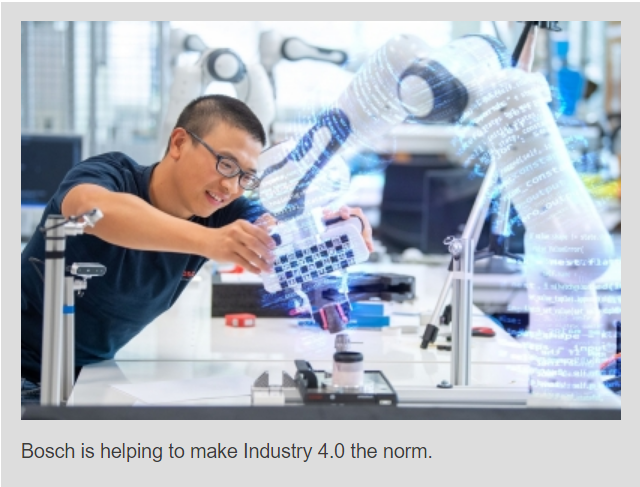Welcome to Sino Bearings web
24x7 HOTLINE:+86-28-81454188

 NEWS
NEWS
Industry 4.0 is coming of age. What began at Hannover Messe in 2011 as a “pioneering German project” has now gained global traction – thanks in part to groundbreaking work by Bosch. The aim is for connected manufacturing to optimize itself automatically, making it economical to produce customized products in batch sizes even as small as one.
Since 2012, Bosch has been systematically leading factories – both its own and those of its customers – into this new industrial age. This commitment is paying off: over the past ten years, the company has generated more than four billion euros in sales with Industry 4.0. In 2020 alone, Bosch generated sales of more than 700 million euros with connected manufacturing solutions.
“We recognized the potential of Industry 4.0 early on and are pioneers in this field. Now we’re reaping the rewards,” says Rolf Najork, the member of the Bosch board of management, responsible for industrial technology.
The use of Industry 4.0 in the company’s own plants is also paying off. Bosch is combining intelligent software for production control, monitoring, and logistics planning into a manufacturing platform of its own. This connects to a larger database that simplifies and improves tasks such as AI analyses for fault detection. The roll-out of the new Bosch manufacturing and logistics platform will start at the end of 2021.
“We offer our roughly 240 plants a standardized ‘Industry 4.0 toolbox,’ which can be expanded and deployed as needed,” Najork says.
Bosch believes this will save it almost one billion euros over the next five years, following an investment of around 400 million euros.
The beginnings: Bosch does pioneering work on Industry 4.0
Back in 2011 at Hannover Messe, scientists presented an idea that broke with convention. Rather than have people adapt to machines, they turned things around. The vision here was of products that actively involve themselves in their manufacturing, navigate themselves through the production process, and communicate with humans and machines. It was the birth of Industry 4.0 – Bosch is one of its founding fathers.
In 2012, the company took over the chairmanship of the newly established Industry 4.0 working group to further develop the German government’s high-tech strategy. Bosch became a leading provider and a leading user of Industry 4.0, not only testing this modern form of manufacturing in its own plants, but also bringing proven solutions to the market. The Bosch plants in Blaichach in Germany, Anderson in the U.S., and Wuxi and Suzhou in China were pioneers in this domain and have been the recipient of multiple awards for their innovative concepts, including the designation of “lighthouse factories” by the World Economic Forum.
At the same time, one thing soon became apparent: “The only way to tap the full potential of Industry 4.0 is collectively and globally. Humans and machines need to ‘speak the same language.’ This requires international, cross-company standards,” Najork says.
Bosch worked together with other companies to develop OPC Unified Architecture (OPC UA), a machine language for Industry 4.0 that standardizes access to devices and systems and enables manufacturer-independent data exchange. There was also increased collaboration between organizations such as Plattform Industrie 4.0 and the Industrial Internet Consortium, with Bosch an active leader in both. Alliances became an integral part of Industry 4.0.
And today? Interest is still high, but too few companies are consistently gearing up for Industry 4.0: “Pilot projects are a good approach for trying things out and getting ideas out there. Now it’s time to up the tempo: we need to make Industry 4.0 the norm,” Najork says. Bosch uses its own academies and training courses to train associates for Industry 4.0 and also makes this offering available to customers. Najork is convinced that “Industry 4.0 is not an end in itself. It’s a way to maintain competitiveness. In the future, nothing will be possible without digitalization.”
Bosch projects deliver measurable benefit: connected solutions increase productivity by as much as 25 percent, boost machine availability by up to 15 percent, and reduce maintenance costs by as much as 25 percent. “If we want to exploit the potential of Industry 4.0, we have to move away from isolated solutions. Technical systems that work only within their own boundaries inhibit progress,” Najork says.
In Bosch plants, there are now over 120,000 machines and over 250,000 devices such as integrated cameras or robots connected. Some 22,000 machine controllers alone are connected via the Nexeed software for Industry 4.0 developed by Bosch Connected Industry. Founded in 2018, this operating unit has already supplied software to more than half of Bosch’s plants and more than 2,000 production lines. In addition, around 100 international customers rely on Nexeed – including BMW, Sick, and Trumpf. Hardware and software are growing ever closer together.
At Hannover Messe, Bosch Rexroth presented its ctrlX Automation platform. Based on app technology and web engineering, this open, 5G-enabled control technology enables co-creation. The idea behind it is for users to either use apps provided by Bosch Rexroth and third-party providers, or to develop apps themselves and share them with other companies within an ecosystem. “By making developments participatory,” Najork says, “we can create network effects and let ideas take wing.”
“Our focus is on harnessing and combining the power of different technologies. Bosch is becoming an AIoT company. We’re bringing artificial intelligence and the internet of things together,” Najork says.